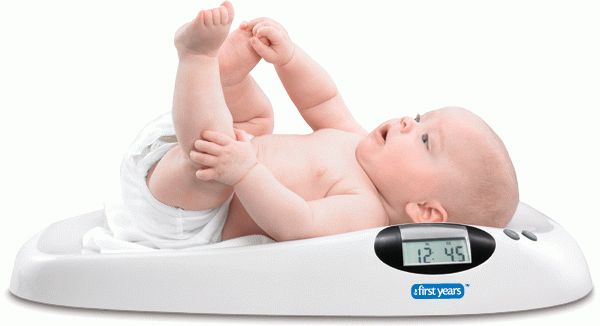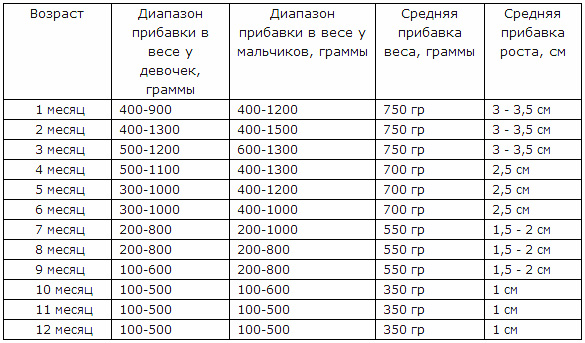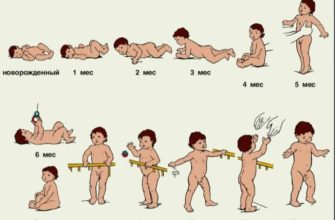You have a baby. You have been waiting for him for a long time, imagining how he will be, and how you will begin to raise and educate him. But when this finally happened, you are suddenly faced with many unforeseen problems. One of them, which does not cease to excite every young mother and all grandmothers in the world, is the norm of weight gain in newborns.

The "reference point" of the weight of the newborn
Each newborn baby is examined by a pediatrician, and at the first examination he is immediately weighed and his height is measured (Newborn growth) Then the child, along with his mother, will remain in the hospital for another 4-6 days for medical supervision. On the day of discharge, he is weighed again. It is from these 2 numbers - weight in the first minutes after birth and weight on the day of discharge from the hospital - that the subsequent weight gain of the newborn begins and largely depends. So:
Birth weight
All babies are born with different indicators of height and weight, and the normal weight of a healthy baby at birth is considered to be in the range from 2,700 kg to 3,700 kg. It should be noted that the initial weight of the child depends on a number of different factors:
- Health baby.
- Heredity. Large mothers with large weights are more likely to have large babies, and vice versa: thin babies have small babies.
- Paula. As a rule, boys are always born larger (heavier) than girls.
- Maternal nutrition during pregnancy. With a nutritious diet of a pregnant woman, the fetus usually gains a large mass.
- Physical and psychological state of a woman. If a mother is unwell or during pregnancy she lived under stress for a long time, then this may well affect the health and, accordingly, the weight of her newborn child.
- The presence of a pregnant bad habits. Of course, sick, underweight children can be born to smokers, let alone drinkers and drug users.
Check Out Weight
In the first few days of life, children lose weight a little. Weight loss is due to several reasons:
- Fluid loss. Having been born, the baby begins to breathe, and a large amount of fluid evaporates through its respiratory system and skin.
- Power installation. In the early days, the baby drinks colostrum, and in small portions, until he gets better nutrition, and his mother begins to arrive milk.
- Adapting to living conditions. We are well aware that the young seedlings that we transplanted from the greenhouse to the garden are beginning to grow far from immediately. So the child, having radically changed the environment at birth, does not immediately get used to living in it.
Thus, the weight at discharge differs by about 6-10% from birth weight. And it is from this, second, figure that it is customary to count the norms of weight gain for each newborn.
Weight Gain
You and your baby were discharged from the hospital, and you were at home. The kid learned to eat, he gradually improves digestion and heat-air exchange with the environment, and he begins to grow rapidly.
[sc: rsa]
Video: child weight
Reasons for weight gain or lack thereof
Weight gain depends on the following reasons:
- Health. If the baby is sick, he eats worse.
- Appetite.
- Type of feeding: breast or artificial. With artificial feeding, children usually gain weight faster.
- The quality and quantity of food (mother’s milk).
- Mobility of the child. The person involved in sports is usually fit. Similarly, an agile child is slightly thinner than a lounger.
- The regimen of the day and meals. When fed “by the hour,” weight grows more slowly than “by demand."
- Age. In the first months, children grow faster, by the year growth slows down.
Be that as it may, the specialist scientists have established some average conditional indicators of the norms of weight gain of newborn children.
Rate of increase: table weight of a child under one year
The average statistics show that usually the weight gain in the first year of life is as follows:
- During the first month, when your child is still very small, weight gain is considered normal. 90-150 grams per week.
- From the second, third and until the end of the fourth month, the baby should already collect 140-200 grams per week.
- From the fifth month to six months, weight is added again by 100-160 grams per week, and by half a year the weight of your baby should increase by about half.
- Further, growth begins to slow down a little, and by one year the baby weighs about 3 times more than it was at birth.

Deviations from the norm: whether to worry
Very often there are deviations from the above average values. This is too small or excessively large weight gain, which is also bad, because too fat guys become inactive and slower to develop. In addition to possible diseases of the baby, the causes of such deviations can be as follows:
- Each person in his physiology is individual, and everything grows differently: someone is a little faster, and the other is a little slower.
- Norms of weight gain in all newborns of larger stature are usually greater. So, if for a baby whose initial height was 52 cm, an increase of 170 grams is considered normal, then for a child with an initial height of 58 cm it is already about 210 grams.
- It often happens that boys gain weight faster than girls.
- With artificial nutrition, kids get fat faster.
And there are many other reasons that are different in each case, and it is possible to identify them only with an individual approach. And only after identifying these reasons, it is possible to give an exact answer whether parents should worry about this and take urgent measures. In any case, the rates of weight gain in newborns are averaged and approximate, and you should not take them for the ideal. And if in doubt about the growth of the child, it is best to take tests and consult with specialists. If you and your baby are healthy, then perhaps for the appearance of rounded folds on his body, it is enough to start feeding him on demand, often putting him to his chest, and this will solve the problem.
Related >>>









This table shows approximate increases in height and weight in children of the first year of life. Nevertheless, it should be remembered that all children are different, so the growth and weight gain of your child may differ from the values indicated in the table.
Good day. Please tell my baby 1 month. Very often it poops, and to be more precise it swears as much the foam comes out and, moreover, it is blown and the mucous foam comes out. I breastfeed.
My baby was gaining weight very poorly, we changed the mixture to Materna for light-weight children, she saved us. Helps to gain weight and develop.
Tatyana, in a month a child poops almost every time it buys. Foam is not a deviation. Diarrhea is called if feces is accompanied by fever, crying baby, vomiting. My child had direct champagne from there. After some time itself passed. If there is a temperature, you will have to take tests.